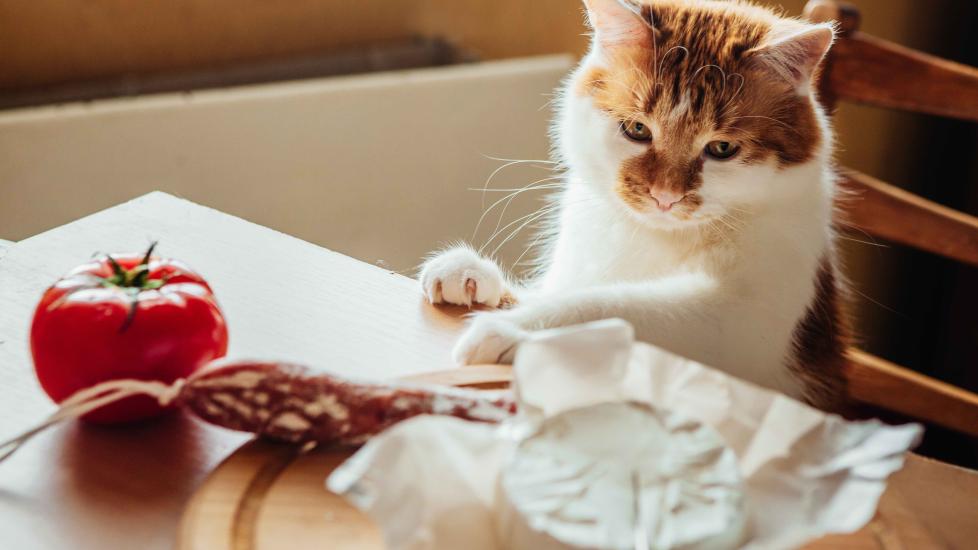Can Cats Eat Cheese?
NOTE: Always check with your veterinarian first before giving your dog any new foods, especially “people foods.” What might be OK for one dog might not be good for your dog, depending on multiple factors, such as their age, health history, health conditions, and diet. Dogs on prescription diets should not be fed any food or treats outside the diet.
We often think of cats and milk together—and cheese is only a small step away from milk from a nutritional perspective. And you might have noticed that your kitty is interested whenever you have cheese out; but can cats have cheese?
Yes, cats can eat cheese—with some guidelines in place. For example: Many cats experience lactose intolerance, limiting the cheeses available as options. Here’s what to know about safely sharing cheese with your kitty.
Is Cheese Bad for Cats?
Cheese, in moderation, can be a very nutritious treat to share with your kitty. It’s not toxic to cats, and it’s considered high in protein as well as calcium.
However, many—perhaps most —cats either have lactose intolerance or an allergy to dairy products. This means that quite a few adult cats will experience gastrointestinal upset such as vomiting, diarrhea, abdominal pain, or gas after eating only a small amount of milk or cheese. Unfortunately, this means that these cats shouldn’t be fed any dairy products at all.
The other concern with cheese is that it’s very high in calories. In fact, a 1-ounce square of cheddar for a cat is somewhat like a human scarfing two and a half cheeseburgers! So, the amount of cheese given to cats should be limited to no more than a dice-sized square only once or twice per week.
What Cheeses Can Cats Eat?
If you would like to share a small amount of cheese with your cat and know that she isn’t allergic to dairy or lactose intolerant, there are some cheeses that are better for cats than others. Look for firm cheeses that are plain with no additives. Some to consider include:
-
Cheddar
-
Swiss
-
Parmesan
-
Provolone
-
Gouda
-
Goat cheese (though, because this is higher in fat and lower in vitamin D than some other cheeses)
Cheeses to avoid include the softer cheeses, which often are much higher in lactose. Stay away from:
-
Cottage cheese
-
Cream cheese
-
Mozzarella
-
Brie
-
Blue cheese
-
Camembert
-
American cheese (this is a processed food that’s very high in carbohydrates)
Cream Cheese
Cream cheese is one of the cheeses on the no-no list. As a softer cheese, cream cheese has more lactose than many other varieties and is likely to trigger an episode of vomiting and diarrhea.
Cottage Cheese
Much like cream cheese, cottage cheese is relatively high in lactose and may cause gastrointestinal distress in kitties. As tempting as it might be to share the carton once it is empty, cottage cheese is best avoided by cats.
String Cheese
Most string cheeses are made of mozzarella (a soft cheese), sometimes mixed with firmer provolone. Whether raw (like in string cheese) or cooked (like on pizza), mozzarella is high in lactose and likely to upset the sensitive kitty tummy. Provolone is better tolerated by many cats. If your kitty must have a bite, keep the portion small. But overall, it’s best to just say no to sharing your string cheese.
Cheesecake
Cheesecake is not safe to share with cats. Not only does it contain soft cheese (often cream cheese or ricotta), but it also has additional ingredients that may make your kitty sick—or are even toxic to cats.
Cheez-Its
Cheez-Its and other cheese crackers are also on the no-go list. These baked treats have tons of additional ingredients that may not be healthy for cats. Also, being high in calories, fats, and carbs, this treat is really nothing but “empty calories” for your cat and is best avoided.
My Cat Ate Cheese. What Should I Do?
If your cat manages to steal some cheese, you might be wondering what to do. If your cat is otherwise healthy and only a reasonably small amount of cheese was eaten, it’s likely safe to simply monitor the situation at home. Most healthy cats who eat a small amount of cheese of any variety will be fine, aside from perhaps a bit of gastrointestinal upset.
But if you notice your kitty isn’t feeling well, her appetite is reduced, or she’s vomiting and/or has diarrhea, call your veterinarian.
For cats with any underlying health conditions, it’s better to be proactive and call your veterinarian before any symptoms develop. This is especially true for cats with:
How to Safely Feed Your Cat Cheese
If you would like to share a cheese snack with your kitty (and know she doesn’t have a dairy allergy and isn’t lactose intolerant), look for hard cheese like cheddar or Swiss. Cut a small cube (no more than the size of a dice!) and break it down into smaller pieces so your cat doesn’t gulp it all in one bite.
The amount of cheese given to cats should be limited to no more than a dice-sized square only once or twice per week.
Remember that moderation is the key. Don’t give out a second serving, and only offer cheese once or twice a week as a special treat. Always keep an eye on your kitty for a few days to make sure that no vomiting or diarrhea develops.
Featured Image: Adobe/Yulia
